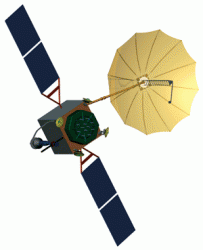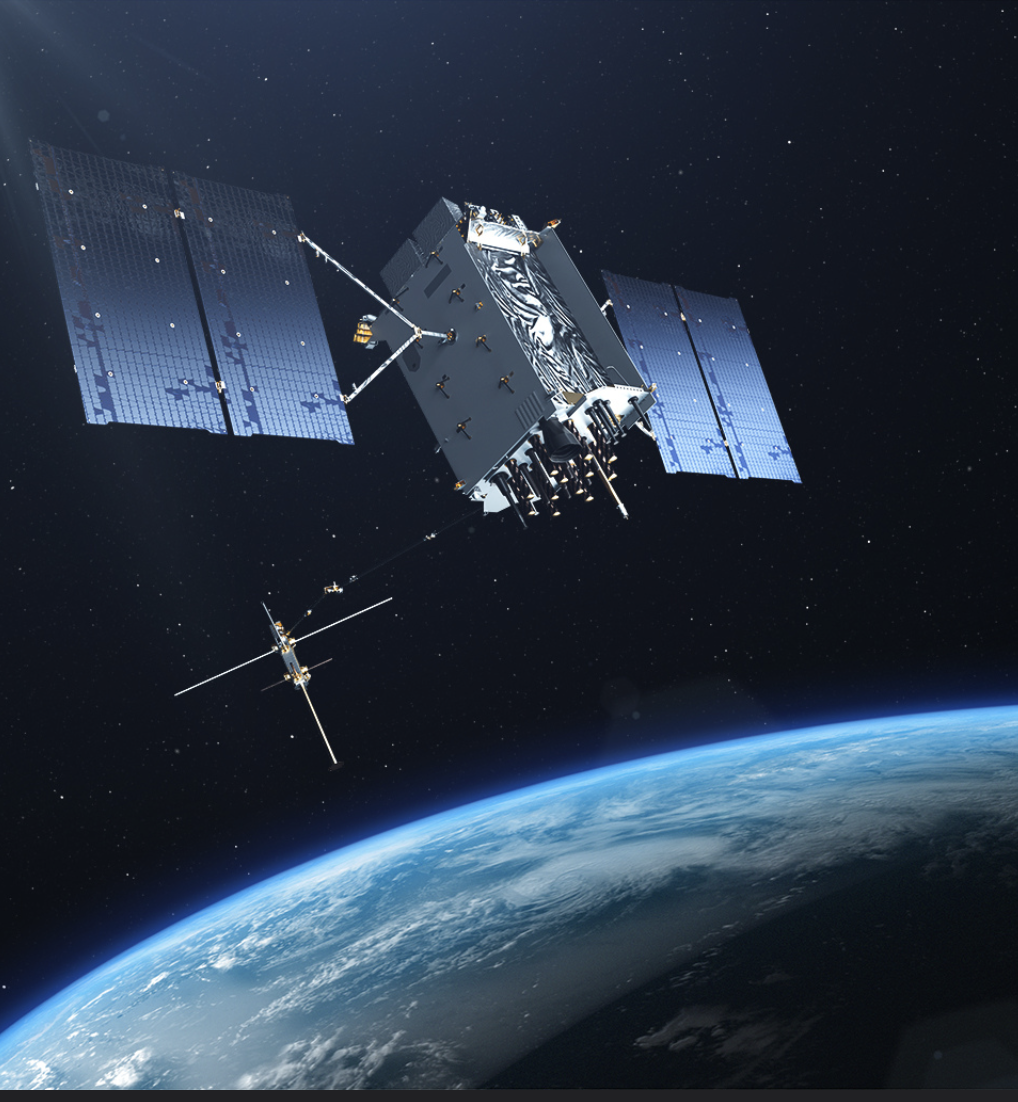 GPS III conceptual drawing, The Aerospace Corporation
GPS III conceptual drawing, The Aerospace CorporationThe Air Force has further delayed the announcement of its decision on who will be the prime contractor for the next block of GPS satellites, IIIA. Earlier reports had set the contract award announcement for early April.
On Wednesday (April 23), Anthony Russo, deputy director of the National Coordination Office for Space-Based Positioning, Navigation, and Timing (PNT), told a European Navigation Conference 2008 in Toulouse, France, that "source selection" has been identified. He added, "I had hoped to announce [the results] at this conference, but the process is not complete yet."
Source selection means that the GPS Wing at the Space and Missile Systems Center (SMC) has completed its
evaluation of the bids on the contract and the preferred provider for the new generation of satellites. The Wing — responsible for overseeing the acquisition of GPS space, ground, and military user equipment — has a presentation ready on the IIIA contract award but is waiting to brief the Air Force decision maker, in this case, apparently Air Force Secretary Michael Wynne.
The Air Force has further delayed the announcement of its decision on who will be the prime contractor for the next block of GPS satellites, IIIA. Earlier reports had set the contract award announcement for early April.
On Wednesday (April 23), Anthony Russo, deputy director of the National Coordination Office for Space-Based Positioning, Navigation, and Timing (PNT), told a European Navigation Conference 2008 in Toulouse, France, that "source selection" has been identified. He added, "I had hoped to announce [the results] at this conference, but the process is not complete yet."
Source selection means that the GPS Wing at the Space and Missile Systems Center (SMC) has completed its
evaluation of the bids on the contract and the preferred provider for the new generation of satellites. The Wing — responsible for overseeing the acquisition of GPS space, ground, and military user equipment — has a presentation ready on the IIIA contract award but is waiting to brief the Air Force decision maker, in this case, apparently Air Force Secretary Michael Wynne.
Competing teams headed by Boeing and Lockheed Martin are reportedly
locked in a tight race for the contract. The GPS IIIA decision could
also have an significant effect on the fortunes of the two companies in
their efforts to compete for work in Europe’s Galileo program under provisions of Galileo’s procurement plan that allow non-European companies to participate.
On April 18, the SMC said it is “finalizing actions necessary to complete preparations for Key Decision Point-B and the contract award decision . . . for GPS Block IIIA.” With a value estimated as about $3 billion, the GPS III space segment contract represents a substantial prize for the winner and a cornerstone of GPS modernization efforts.
After yearslong delays in the release of a request for proposals the Air Force says it will
announce the winner in May. One source placed the date more
specifically at May 9. Recent appeals of Air Force contracts have
probably made officials there more intent on crossing the t’s and
dotting the i’s on acquistion procedures to avoid new protests of their decisions.
Some concern has been expressed by industry and government officials that further delays in making the award could allow the contract to be put on hold as the Bush administration begins winding up its affairs in anticipation of the new presidency that will take office following the U.S. elections in November.
GPS IIIA will be the first of three GPS III increments and the foundation for enhancements in later blocks. New capabilities will provide improved positioning, navigation, and timing services, while providing increased resistance to hostile jamming for military users and the incorporation of the L1C signal for compatibility with the European Union’s Galileo constellation. The GPS IIIA contract will be for two research and development vehicles and up to eight production vehicles.
The nominal date for the first launch is 2014. However, GPS Wing officials have said that Congress’ reduction of funds for the program in the 2008 Fiscal Year and postponements of the IIIA decision could push that date back further. Meanwhile, launch of the last two GPS satellites available to the Air Force, Block IIR-M’s built by Lockheed Martin, are scheduled for June and September.
The first of the next-generation GPS Block IIF spacecraft, built by Boeing and still undergoing thermo-vac tests, is scheduled for launch in February 2009, according to Russo.



